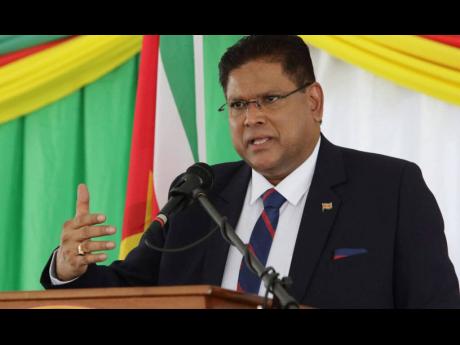‘In CARICOM, we are in charge’
Chairman of regional bloc calls for greater integration as leaders’ summit begins
Political leaders throughout the Caribbean will come together at the 43rd regular meeting of the Conference of the Heads of Government of CARICOM, which gets under way in Paramaribo, Suriname, today.
This comes a week after a tense Commonwealth Heads of Government Meeting in Kigali, Rwanda, where Caribbean candidates Kamina Johnson Smith and incumbent Baroness Patricia Scotland faced off for the post of secretary general. The leaders voted 27-24 in favour of Scotland.
Among the key agenda items in Suriname today will be governance, climate change, food, and energy security, as the leaders seek workable solutions to address the many challenges confronting CARICOM member states, especially in light of the impact of the COVID-19 pandemic and the Russia-Ukraine war.
“There are a lot of issues on the agenda and there are a lot of issues that we have discussed in the past. Those decisions are implemented and institutionalised within the Caribbean region,” said incoming CARICOM Chairman Chandrikapersad Santokhi during a press conference yesterday.
CALLS FOR GREATER INTEGRATION
Santokhi, the president of Suriname, pointed to cross-bordering, health, and security issues as some of the areas of proven success among regional states and called for greater integration across the Caribbean in the trade of goods and services.
“I expressed my view at the last conference and I believe more should be done on economic integration because, as leaders, we are the ones in charge to make those decisions,” the CARICOM chairman stated.
“We can have a problem getting access to the European market, we can have a problem getting access to the US market, or the Canadian market, but here in CARICOM, we are in charge; the Caribbean leaders are in charge.”
CARICOM Secretary General Dr Carla Barnett said she was also looking forward to discussions on other issues such as the CARICOM Single Market and Economy at the conference, which runs from July 3 to 5.
“Part of the reason why we have a common market as a part of the Caribbean Community is that there are trade barriers that need to be removed among ourselves,” Barnett noted at the press conference. “And there are a few issues that need to be addressed that are not your normal trade barriers, but more in terms of non-tariff barriers that we need to work through.”
During the business sessions, the heads of government will also discuss the findings of the Special CARICOM Ministerial Task Force on Agriculture; the impact of COVID-19; a strategy to advocate for a more systematic global response to address the adverse impact of climate change; as well as a plan of work for the Conference of the Parties (COP 27), the United Nations Climate Change Conference to be held in Sharm El-Sheikh, Egypt, in November.

